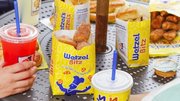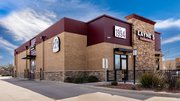Article
Restaurants build on international ground
Restaurants look to international shores to boost their brand and build an image.

April 4, 2007 by Valerie Killifer — senior editor, NetWorld Alliance
When Steve LaMastra took the helm of Raving Brands in 2005, he quickly made the conclusion the company needed to expand.
With several successful concepts — Moe's Southwest Grill, Mama Fu's and Doc Green's Gourmet Salads & Grill — steadily performing, LaMastra and the company set their sites abroad and opened their first Doc Green's in Singapore in January. They also have signed franchise agreements for the development of 150 restaurants, including Doc Green's and Moe's, in markets that include the Middle East and Canada.
"Our food and our experience is really compelling within our brand, and that's going to resonate with international consumers, we believe, as well as domestically," he said. "We're confident our concepts will be well received."
Raving Brands isn't the first fast casual or quick-serve restaurant banking on the international market to boost its image. Au Bon Pain, Burger King, McDonald's, KFC and plenty of others, also are following suit.
Burger King recently inked expansion deals for locations in Egypt, Poland and Hong Kong, further promoting its international brand appeal.
"We are excited to expand the Burger King brand into downtown Hong Kong, adding to our existing locations at the airport and The Peak, one of Hong Kong's most popular tourist attractions," said Peter Tan, president of Burger King Asia Pacific. "North Asia Strategic has a history of business success in Hong Kong, and they understand how to thrive in the region." For their Hong Kong expansion, Burger King's subsidiary, BK ASIAPAC, PTE. LTD., awarded exclusive development rights to a fully-owned subsidiary of North Asia Strategic Holdings Limited.And the first downtown Hong Kong Burger King is expected to open in 2007.
From here to there
But what makes the international market, especially the Middle East and Asian regions, such a hotbed of growth?
For fast casuals, the door opened because quick-service brands led the international-expansion way.
"The fast casual segment in particular is going to be well received (internationally) because there are not a lot of options in our segment," LaMastra said. "For example, the QSR industry is seeing more limited growth domestically than we are, but what we're going to see with our brands is less competition overseas. We believe that's true in Canada. In Canada ... fast casual again is just hitting its early-growth stride and we believe being there is going to give us a great first-mover advantage."
There also is a demand for fast casual restaurants because they are rarely found outside the United States.
| ||||||||||||||||||
"The fast casual segment really hasn't come to Canada overall," said Silver, who was introduced to the Moe's concept while living in Atlanta. "There are not a lot of places that offer fresh food in the casual dining environment."
Canada has many of the same restaurant attributes found in several other international locations: more quick-service concepts that have penetrated the market.
"Pizza Hut, McDonald's and KFC have established themselves in those markets and have paved the way for us to go and grow over there," LaMastra said. "The audience, just like the U.S., is growing and maturing."
From there to here
While so many U.S.-based restaurants are looking abroad for growth, a surprising number of chains are tapping into the Americas to boost their brands as well.
Allen developed the Vamonos Taqueria fast-casual concept so Mexico-based Grupo Anderson could enter the United States market. Grupo Anderson operates several restaurant concepts, including Carlos'n Charlie's and Señor Frog's.
The U.S. market is so appealing because consumers have more discretionary income and they typically "trade up" — opting for higher-quality ingredients at slightly larger price points, says Allen.
"Consistently every year, the restaurant industry takes a bigger segment of the pie between restaurants and grocery stores," he said. "Because the American marketing machine is so powerful ... they look at that and think 'I need to buy my way into the industry instead of going out on my own.'"
 ChatGPT
ChatGPT Grok
Grok Perplexity
Perplexity Claude
Claude









